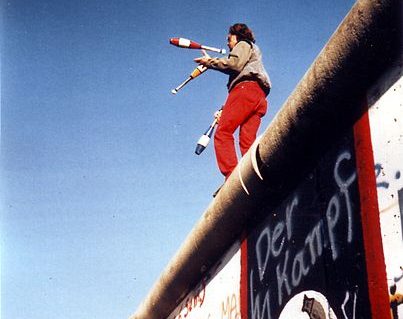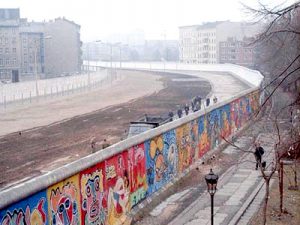The Wall Comes Down

Wall Up
13 August 1961: East German police and troops occupied the dividing line between that Soviet satellite and West Berlin, to stop the hemorrhaging of its citizens to the West of that city. Four days later, they started building the Berlin Wall. President Kennedy put US forces on alert and took diplomatic steps, but copped criticism for what was tagged a weak response. Possibly 200 people were killed trying to get over the Wall from the East to the West; probably many more of the tens and tens of thousands making the attempt over the years were dealt with harshly. Perhaps the immediate response to construction was feeble, but in pretty short time, the West realised not only that ‘fixed fortifications are monuments to the stupidity of mankind,’ but also, it had been handed an invaluable propaganda tool:
26 June, 1963: Kennedy went to West Berlin and gave a speech for the ages. Arthur Schlesinger, in A Thousand Days, wrote of it:
“Then on to Berlin and the wildest reception of all, three-fifths of the population of West Berlin streaming into the streets, clapping, waving, crying, cheering, as if it were the second coming. Before paying the ordained visit to the city hall and signing the Golden Book, Kennedy made his first inspection of the Wall. No one is ever prepared for the Wall; it shocked and appalled the President, and he was still angry when he came out of the city hall and faced the seething crowd…his words were true but unwontonly harsh…”
Kennedy had an effective mantra – he suggested many didn’t understand or want to understand the struggle of the Cold war, or were betting on Communism as the wave of the future, or thought we could work with the Communists, and that at least Communism permitted economic progress, each time stating in eloquent refutation: “Let them come to Berlin!” And then he made the lethal charge:
“Freedom has many difficulties, and democracy is not perfect, but we have never had to put a wall up to keep our people in…”
His peroration was just as stunning, in its symbolic we’ll-stand-by-you derring-do:
“All free men, wherever they may live, are citizens of Berlin, and therefore, as a free man, I take pride in the words ‘Ich bin ein Berliner.’”
Schlesinger noted that the crowd was so electrified by his presence and words that Kennedy was disturbed; he felt “that if he had said, ‘March to the wall – tear it down,’ his listeners would have marched.”
A generation later, on 12 June 1987, standing before the Brandenburg Gate commemorating the 750th anniversary of the ancient city, President Reagan had no similar qualms. He wondered if the recent relaxations in the USSR were genuine steps or a token. He invited a gesture that would be more than a token:
“There is one sign the Soviets can make that would be unmistakable, that would advance dramatically the cause of freedom and peace. General Secretary Gorbachev, if you seek peace, if you seek prosperity for the Soviet Union and eastern Europe, if you seek liberalisation, come here to this gate. Mr. Gorbachev, open this gate. Mr. Gorbachev, tear down this Wall.”
Wall Down
The iron curtain across Eastern Europe was rusted and crumbling. On 9 November 1989, the East German government folded like a cheap suit made by Marxist weavers. By noon that day, the gates were open and people were dancing. By nightfall, the Wall was ‘down.’ In an exquisite irony, Soviet satellites then toppled like dominoes in a ‘largely bloodless’ fashion: Poland, the Baltics, Hungary, Bulgaria, Czechoslavakia, Armenia, Ukraine, and so on. The symbolism was so vivid, and the Soviet collapse so complete, that premature talk about the ‘end of history’ obscured the perpetual chaos and control in human affairs that would continue, and will continue, until the sun blows up.
In a November 1989 article in “Rolling Stone,” P.J. O’Rourke went to the Wall (already a martyr to souveniring) – he wrote: “The people in the crowd weren’t yelling or demanding anything. They weren’t waiting for anything to happen. They were present from sheer glee at being alive in this place at this time. They were there to experience the opposite of the existential anguish which has been the twentieth century’s designer mood. And they were happy with the big, important happiness that – the Declaration of Independence reminds us – is everybody’s, even a Communist’s, unalienable right to pursue…Ideology, politics and journalism, which luxuriate in failure, are impotent in the face of hope and joy.”
Leave a comment...
While your email address is required to post a comment, it will NOT be published.



0 Comments